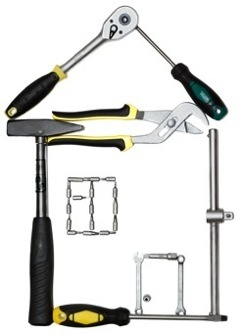
Whether you're planning an addition for a growing family or simply getting new storm windows, finding a competent and reliable contractor is the first step to a successful and satisfying home improvement project.
Your home may be your most valuable financial asset. That's why it's important to be cautious when you hire someone to work on it. Home improvement and repair and maintenance contractors often advertise in newspapers, the Yellow Pages, and on the radio and TV. However, don't consider an ad an indication of the quality of a contractor's work. Your best bet is a reality check from those in the know: friends, neighbors, or co-workers who have had improvement work done. Get written estimates from several firms. Ask for explanations for price variations. Don't automatically choose the lowest bidder.
Home Improvement Professionals
Depending on the size and complexity of your project, you may choose to work with a number of different professionals:
- General Contractors manage all aspects of your project, including hiring and supervising subcontractors, getting building permits, and scheduling inspections. They also work with architects and designers.
- Speciality Contractors install particular products, such as cabinets and bathroom fixtures.
- Architects design homes, additions, and major renovations. If your project includes structural changes, you may want to hire an architect who specializes in home remodeling.
- Designers have expertise in specific areas of the home, such as kitchens and baths.
- Design/Build Contractors provide one-stop service. They see your project through from start to finish. Some firms have architects on staff; others use certified designers.
Don't Get Nailed
Not all contractors operate within the law. Here are some tip-offs to potential rip-offs. A less than reputable contractor:
- solicits door-to-door;
- offers you discounts for finding other customers;
- just happens to have materials left over from a previous job;
- only accepts cash payments;
- asks you to get the required building permits;
- does not list a business number in the local telephone directory;
- tells you your job will be a "demonstration;"
- pressures you for an immediate decision;
- offers exceptionally long guarantees;
- asks you to pay for the entire job up-front;
- suggests that you borrow money from a lender the contractor knows. If you're not careful, you could lose your home through a home improvement loan scam.

Hiring a Contractor
Interview each contractor you're considering. Here are some questions to ask.
- How long have you been in business? Look for a well-established company and check it out with consumer protection officials. They can tell you if there are unresolved consumer complaints on file. One caveat: No record of complaints against a particular contractor doesn't necessarily mean no previous consumer problems. It may be that problems exist, but have not yet been reported, or that the contractor is doing business under several different names.
- Are you licensed and registered with the state? While most states license electrical and plumbing contractors, only 36 states have some type of licensing and registration statutes affecting contractors, remodelers, and/or specialty contractors. The licensing can range from simple registration to a detailed qualification process. Also, the licensing requirements in one locality may be different from the requirements in the rest of the state. Check with your local building department or consumer protection agency to find out about licensing requirements in your area. If your state has licensing laws, ask to see the contractor's license. Make sure it's current.
- How many projects like mine have you completed in the last year? Ask for a list. This will help you determine how familiar the contractor is with your type of project.
- Will my project require a permit? Most states and localities require permits for building projects, even for simple jobs like decks. A competent contractor will get all the necessary permits before starting work on your project. Be suspicious if the contractor asks you to get the permit(s). It could mean that the contractor is not licensed or registered, as required by your state or locality.
- May I have a list of references? The contractor should be able to give you the names, addresses, and phone numbers of at least three clients who have projects similar to yours. Ask each how long ago the project was completed and if you can see it. Also, tell the contractor that you'd like to visit jobs in progress.
- Will you be using subcontractors on this project? If yes, ask to meet them, and make sure they have current insurance coverage and licenses, if required. Also ask them if they were paid on time by this contractor. A "mechanic's lien" could be placed on your home if your contractor fails to pay the subcontractors and suppliers on your project. That means the subcontractors and suppliers could go to court to force you to sell your home to satisfy their unpaid bills from your project. Protect yourself by asking the contractor, and every subcontractor and supplier, for a lien release or lien waiver.
- What types of insurance do you carry? Contractors should have personal liability, worker's compensation, and property damage coverage. Ask for copies of insurance certificates, and make sure they're current. Avoid doing business with contractors who don't carry the appropriate insurance. Otherwise, you'll be held liable for any injuries and damages that occur during the project.
Checking References
Talk with some of the remodeler's former customers. They can help you decide if a particular contractor is right for you. You may want to ask:
- Can I visit your home to see the completed job?
- Were you satisfied with the project? Was it completed on time?
- Did the contractor keep you informed about the status of the project, and any problems along the way?
- Were there unexpected costs? If so, what were they?
- Did workers show up on time? Did they clean up after finishing the job?
- Would you recommend the contractor?
- Would you use the contractor again?
Understanding Your Payment Options
You have several payment options for most home improvement and maintenance and repair projects. For example, you can get your own loan or ask the contractor to arrange financing for larger projects. For smaller projects, you may want to pay by check or credit card. Avoid paying cash. Whatever option you choose, be sure you have a reasonable payment schedule and a fair interest rate. Here are some additional tips:
- Limit your downpayment. Try to limit your down payment. Some state laws limit the amount of money a contractor can request as a down payment. Contact your state or local consumer agency to find out what the law is in your area.
- Pay as you go. Try to make payments during the project contingent upon completion of a defined amount of work. This way, if the work is not proceeding according to schedule, the payments also are delayed.
- Pay last amount only when job is done. Don't make the final payment or sign an affidavit of final release until you are satisfied with the work and know that the subcontractors and suppliers have been paid. Lien laws in your state may allow subcontractors and/or suppliers to file a mechanic's lien against your home to satisfy their unpaid bills. Contact your local consumer agency for an explanation of lien laws where you live.
- Final Cost vs. Estimate. Some state or local laws limit the amount by which the final bill can exceed the estimate, unless you have approved the increase. Check with your local consumer agency.
- Pay by credit card. If you have a problem with merchandise or services that you charged to a credit card, and you have made a good faith effort to work out the problem with the seller, you have the right to withhold from the card issuer payment for the merchandise or services. You can withhold payment up to the amount of credit outstanding for the purchase, plus any finance or related charges.
A Common Home Improvement Loan Scam
The Set Up:
A contractor calls or knocks on your door and offers to install a new roof or remodel your kitchen at a price that sounds reasonable. You tell him you're interested, but can't afford it. He tells you it's no problem and he can arrange financing through a lender he knows. You agree to the project, and the contractor begins work. At some point after the contractor begins, you are asked to sign a lot of papers. The papers may be blank or the lender may rush you to sign before you have time to read what you've been given to sign. You sign the papers. Later, you realize that the papers you signed are a home equity loan. The interest rate, points and fees seem very high. To make matters worse, the work on your home isn't done right or hasn't been completed, and the contractor, who may have been paid by the lender, has little interest in completing the work to your satisfaction.
Here's How to Protect Yourself:
Don't:
- Agree to a home equity loan if you don't have enough money to make the monthly payments.
- Sign any document you haven't read or any document that has blank spaces to be filled in after you sign.
- Let anyone pressure you into signing any document.
- Deed your property to anyone. First consult an attorney, a knowledgeable family member, or someone else you trust.
- Agree to financing through your contractor without shopping around and comparing loan terms.
Getting a Written Contract
Contract requirements vary by state. Even if your state does not require a written agreement, ask for one. A contract spells out the who, what, where, when and cost of your project. The agreement should be clear, concise and complete. Before you sign a contract, make sure it contains:
- The contractor's name, address, phone, and license number, if required.
- The payment schedule for the contractor, subcontractors and suppliers.
- An estimated start and completion date.
- The contractor's obligation to obtain all necessary permits.
- How change orders will be handled. A change order - common on most remodeling jobs - is a written authorization to the contractor to make a change or addition to the work described in the original contract. It could affect the project's cost and schedule. Remodelers often require payment for change orders before work begins.
- A detailed list of all materials including color, model, size, brand name, and product.
- Warranties covering materials and workmanship. The names and addresses of the parties honoring the warranties - contractor, distributor or manufacturer - must be identified. The length of the warranty period and any limitations also should be spelled out.
- What the contractor will and will not do. For example, is site clean-up and trash hauling included in the price? Ask for a "broom clause." It makes the contractor responsible for all clean-up work, including spills and stains.
- Oral promises also should be added to the written contract.
- A written statement of your right to cancel the contract within three business days if you signed it in your home or at a location other than the seller's permanent place of business. During the sales transaction, the salesperson (contractor) must give you two copies of a cancellation form (one to keep and one to send back to the company) and a copy of your contract or receipt. The contract or receipt must be dated, show the name and address of the seller, and explain your right to cancel.


Keeping Records
Keep all paperwork related to your project in one place. This includes copies of the contract, change orders and correspondence with your home improvement professionals. Keep a log or journal of all phone calls, conversations and activities. You also might want to take photographs as the job progresses. These records are especially important if you have problems with your project - during or after construction.
Completing the Job: A Checklist
Before you sign off and make the final payment, use this checklist to make sure the job is complete. Check that:
- All work meets the standards spelled out in the contract.
- You have written warranties for materials and workmanship.
- You have proof that all subcontractors and suppliers have been paid.
- The job site has been cleaned up and cleared of excess materials, tools and equipment.
- You have inspected and approved the completed work.
Where to Complain
If you have a problem with your home improvement project, first try to resolve it with the contractor. Many disputes can be resolved at this level. Follow any phone conversations with a letter you send by certified mail. Request a return receipt. That's your proof that the company received your letter. Keep a copy for your files.
If you can't get satisfaction, consider contacting the following organizations for further information and help:
- State and local consumer protection offices.
- Your state or local Builders Association and/or Remodelor's Council.
- Your local Better Business Bureau.
- Action line and consumer reporters. Check with your local newspaper, TV, and radio stations for contacts.
- Local dispute resolution programs.
For More Information
Federal Trade Commission: http://www.ftc.gov/
National Association of Home Builders Remodelor's Council: http://www.nahb.com/
To order a free copy of How to Find a Professional Remodeler, send a self-addressed stamped envelope to: NAHB Remodelors Council Dept. FT 1201 15th Street, NW Washington, DC 20005
National Association of Consumer Agency Administrators: http://www.nacaa.net/
 Print
Print Email
Email







